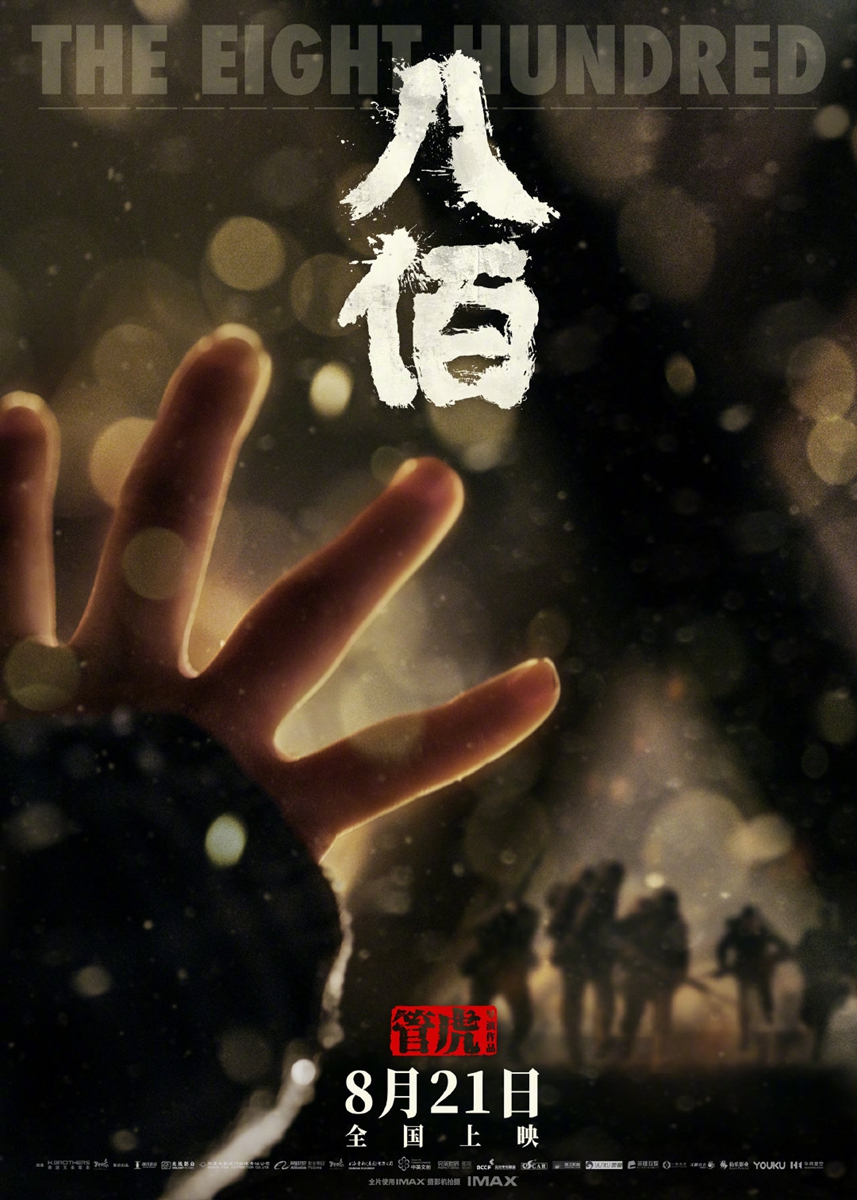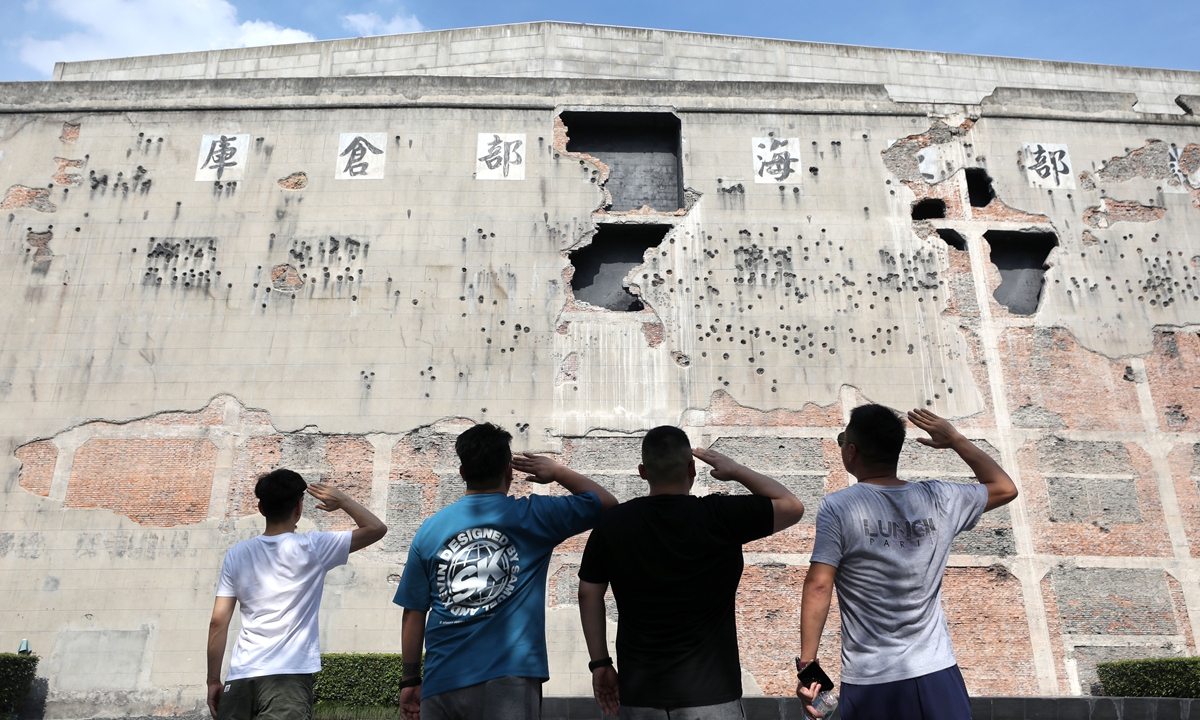Chinese mark 75th anniversary of Japan’s surrender, calling on Japan to draw lesson from past
By Liu Xin Source: Global Times Published: 2020/8/14 14:22:27

The promotion material of The Eight Hundred Photo: Weibo
Tens of thousands of movie goers are expected to head to theaters across China on Friday night for the release of a movie that depicts Chinese soldiers' perseverance in a battle in 1937 against Japanese invaders, despite strict COVID-19 prevention measures, as the country looks to remember the 75th anniversary of Japan's surrender in World War II on Saturday.
While some Chinese people will prefer to remember one of the country's most painful memories by watching the movie in theaters, even more expressed their sentiments on social media by denouncing Japanese militarism and relishing a stronger, wealthier China that now has the ability to defend the Chinese people.
They say that lagging behind leaves the country vulnerable to invasion and bullying. Such a perspective is even more relevant now, as China seems to be facing endless confrontations ignited by the US.
The Eight Hundred starts its limited release across China on Friday night. It debuted in Chinese theaters alongside various activities held in the country to commemorate China's hard-won victory over Japanese invaders 75 years ago, and has won more than 6 million yuan in box office sales by Thursday night. More box-office numbers are expected to come as many netizens commented online that they would love to go to cinemas to pay tribute to the historical scene.
In addition to the movie, which depicts Chinese soldiers' defense of a warehouse against the invading Japanese army during the Battle of Shanghai in 1937, Shanghai recently opened an exhibition of items related to the battle.
The Battle of Shanghai in 1937 was the first of 22 major engagements between Chinese soldiers and the Imperial Japanese Army, and was described as one of the most "tragic" battles that Chinese people faced.

Shanghai residents salute a memorial wall of the Sihang Warehouse on Friday, where Chinese soldiers defended against the invading Japanese army, to remember the 75th anniversary of Japan's surrender in World War II on Saturday. Photo: Yang Hui/GT
These items carry the memories of that tragic battle and show how Chinese at the time risked their lives to protect the motherland from invaders, chinanews.com reported, citing visitors at the exhibition.
Many TV series and movies about the anti-Japanese war have also been released and streamed to the public for free in some cities. Pictures have been shared on social media showing Chinese people being slaughtered by invaders, a child crying behind the mother's dead body, and shabby cities full of ruins controlled by the Japanese.
Many netizens commented that the tragic images remind the Chinese people of their painful history, and alert us to the fact that any country that lags behind could leave millions of lives vulnerable to other countries' invasion. Some netizens also expressed hope for peace.
"Our happy lives are built on the sacrifices of millions of Chinese. As the new generation of the country, we must stand up and carry on fighting for the country's future," a netizen commented on Sina Weibo.
Every Chinese should remember that history, as the lessons we learned from our tragic past have become an important part of our national spirit: uniting together to fight against invasion, Lü Yaodong, director of the Chinese Academy of Social Sciences' Institute of Japanese Studies, told the Global Times.
Refreshing the memories and spirit of the past is particularly important today, as another major country is attacking and pressuring China, Lü said.
Commemorating history also reminds us to cherish our hard-won peace and to be cautious of those who undermine peace and stability, Lü said, noting that China-Japan ties have recently been enduring a chill as Japan is seemingly surrendering to US pressure.
Chinese observers also noted that considering the current chill in China-Japan ties caused by the Japanese side, Japan, which had historically brought great misery to the Chinese people, should learn from history and not follow the same path.
Despite warm and positive signals sent by the two sides at the beginning of the year, especially when China and Japan supported each other in the fight against the coronavirus, more friction has been seen in bilateral ties, experts said.
It is the Japanese side that is bringing a negative influence to the ties. There are many problems that exist between China and Japan, and historical issues are at the forefront, considering Japan's lack of sincerity in fulfilling the promises it made after surrendering and the rise of historical revisionism in the country, Lü said.
For example, Japan's Chief Cabinet Secretary Yoshihide Suga said in June that China's passage of the national security law for its Hong Kong Special Administrative Region "shakes international faith" in the "one country, two systems" principle. The remarks drew criticism from China's Foreign Ministry, with a spokesperson telling a press conference on June 30 that Hong Kong affairs are China's domestic affairs and no other country should interfere.
Experts criticized Japan for following the US policies too closely in recent months.
Tokyo has almost become a "sixth eye" to the US-led Five Eyes intelligence alliance that shares information on certain countries, the South China Morning Post reported, citing a US government source.
"If Japan really wants the international community to receive it as a 'peace-loving' nation as it has advertised, it should make more concrete efforts to work toward that goal, rather than moving in the opposite direction," Lü said.
Posted in: SOCIETY